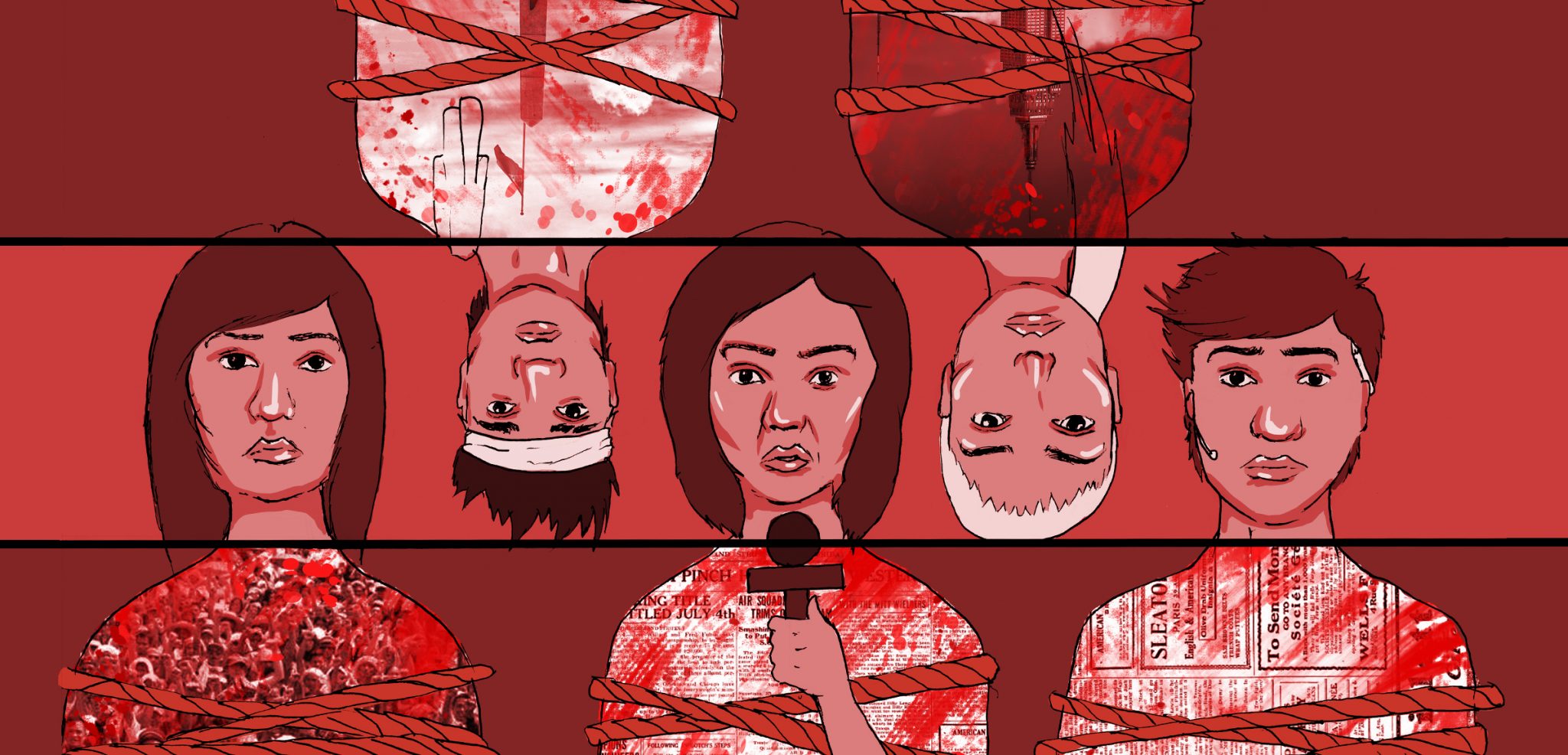How to get away with murder: A culture of impunity
Section 4, Article III. Bill of Rights of the Philippine Constitution states that “No law shall be passed abridging the freedom of speech, of expression, or of the press, or the right of the people peaceably to assemble and petition the government for redress of grievances.”
***
Unique to the press is its inclusion and mention in the law of the land—as no other profession is so directly stated in the Bill of Rights. The explicit mention of the press is no bragging right, but an acknowledgement of how crucial free and independent media is in establishing democracy. Thus, any crimes against journalists—those tasked to carry the torch of truth—is itself a crime against democracy. On a daily basis, journalists put their lives on the line to uncover abuses of power, cases of corruption, and human rights violations. For that, many are persecuted, detained, and killed, thereby propagating a culture of impunity—a culture that threatens the very foundation of democracy itself.
The cause—impunity, a word to describe what happens when actions fail to face their consequences and threats, and when threats, attacks, and murders go unpunished. Such an idea seems unfitting for nations that call themselves democratic, yet unfortunately, unpunished cases have become so rife that it has bred a culture of impunity bent on letting the guilty escape without any accountability for their crimes. Instances like this are not isolated to criminals simply running free. It’s a pattern that we see embedding itself in the minds of the corrupt to hold society’s watchdogs in a chokehold, silencing the truth and championing the culture of impunity.
It’s a pattern that we see embedding itself in the minds of the corrupt to hold society’s watchdogs in a chokehold, silencing the truth and championing the culture of impunity.
In the Philippines alone, 200 members of the press have been slain since 1986 when democracy was restored, says the National Union of Journalists according to Al Jazeera. However, most cases are never resolved and rarely make it to court due to the lack of witnesses willing to step forward, the fear of people in power, the lack of witness protection, and the notoriously slow—and allegedly corrupt—justice system. Making matters worse are comments justifying the murder of journalists, especially when it comes from the President himself.
If local cases aren’t enough to prove the perpetuating culture of impunity among the citizenry, the Philippines ranks as the country with the highest level of impunity (for the people as a whole, not just journalists) according to the 2017 Global Impunity Index of the Universidad de las Americas (UNDAP) Mexico. From the 69 countries in the index, Philippines ranked the highest (or worst) with 75.6 points in terms of impunity levels, followed by India (70.94), Cameroon (69.39), Mexico (69.21), Peru (69.04), Venezuela (67.24), Brazil (66.72), Colombia (66.67), Nicaragua (66.34), Russia (64.49), Paraguay (65.38), Honduras (65.04) and El Salvador (65.03).
Yet justice is also a word that many fail to achieve, particularly in a nation where impunity is rife and symptomatic of a broken justice system.
In the case of journalists, the Philippines ranked fifth on the 2017 Global Impunity Index of the Committee to Protect Journalists (CPJ) among countries with the highest record of impunity in the killing of journalists in the last ten years. From September 1, 2007 to August 31, 2017, the following countries were judged as the worst places for journalists in the following order: Somalia, Syria, Iraq, South Sudan, Philippines, Mexico, Pakistan, Brazil, Russia, Bangladesh, Nigeria and India.
Adding fuel to the fire, the Philippines ranked as the 127th in the 2017 World Press Freedom Index of Reporters Sans Frontieres (RSF)—signaling the poor press freedom in the nation. According to the report, the private militias continue to “silence journalists with complete impunity” in one of the most dangerous countries for the media in the world. Overall, more than 900 journalists have been slain around the globe over the past 11 years for doing their job of informing the public of the truth they are due—with only one in ten cases of media killings resulting in conviction.
***
Justice is a word lawmakers like to throw around to assume the persona of public heroes with a solid moral compass. Yet justice is also a word that many fail to achieve, particularly in a nation where impunity is rife and symptomatic of a broken justice system. And when this culture of impunity continues to thrive, then “The message to all journalists is either watch what you say or watch your back,” says Elisabeth Witchel, author of the CPJ report.
In the middle of the ongoing debate attacking media practitioners in the age of post-truth politics, the value of free journalism has been buried under the socio-political struggles of the country. Yet by forgetting that journalism is a pillar of democracy, we inadvertently participate in creating a climate of fear that discourages people from expressing their thoughts, thereby molding a society unwilling to challenge the corrupt. Slowly but surely, this in turn influences an ineffective judicial system and weak rule of law that prioritizes other agendas over the individual rights of the people—and thus, the culture of impunity remains.
For one dead journalist means one less voice of truth—as impunity thrives on silence.
Unless law enforcement, lawmakers, and the citizens recognize and refuse to participate in this ongoing cancerous culture, then it will only be tolerated until all remnants of democracy become mere shadows of what it once was. Keeping these shadows at bay are journalists—the very voices of truth that speak for justice and carry out the fundamental human right to information. And this is exactly why everyone must be concerned about impunity: for one dead journalist means one less voice of truth—as impunity thrives on silence.





